- Home
- D. Jackson Leigh
Dragon Horse War
Dragon Horse War Read online
Table of Contents
Synopsis
What Reviewers Say About D. Jackson Leigh’s Work
By the Author
Acknowledgments
Dedication
Prologue
Chapter One
Chapter Two
Chapter Three
Chapter Four
Chapter Five
Chapter Six
Chapter Seven
Chapter Eight
Chapter Nine
Chapter Ten
Chapter Eleven
Chapter Twelve
Chapter Thirteen
Chapter Fourteen
Chapter Fifteen
Chapter Sixteen
Chapter Seventeen
Chapter Eighteen
Chapter Nineteen
Chapter Twenty
Chapter Twenty-one
Chapter Twenty-two
Chapter Twenty-three
Chapter Twenty-four
Chapter Twenty-five
Chapter Twenty-six
About the Author
Books Available from Bold Strokes Books
Synopsis
When is war justified to preserve peace?
Society has evolved into one collective belief that celebrates diversity. Luxury credits are earned and spent only after the world population is fed and educated. But when catastrophic weather kills thousands and destroys crops, people begin to look for answers among ancient legends of guilt, retribution, and a vengeful deity.
Jael, seasoned commander of a latent cell of dragon horse warriors, understands what Alyssa, an alluring young priestess, doesn’t—words won’t be enough to quell the violent sect preying on the population’s fear and hunger. As their conflicting ideologies threaten to jeopardize their mission, Alyssa and Jael realize their growing attraction and entwined destiny might be more formidable than the enemy they have been called upon to defeat.
What Reviewers Say About D. Jackson Leigh’s Work
“Call Me Softly is a thrilling and enthralling novel of love, lies, intrigue and Southern charm.”—Bibliophilic Book Blog
“D. Jackson Leigh understands the value of branding and delivers more of the familiar and welcome story elements that set her novels apart from other authors in the romance genre.”—The Rainbow Reader
“D. Jackson Leigh has created very likeable characters in the throes of making very realistic life decisions. She’s also written an enjoyable novel full of humor and great love scenes.”—Just About Write
“Her prose is clean, lean, and mean—elegantly descriptive…”—Out in Print
Dragon Horse War: The Calling
Brought to you by
eBooks from Bold Strokes Books, Inc.
http://www.boldstrokesbooks.com
eBooks are not transferable. They cannot be sold, shared or given away as it is an infringement on the copyright of this work.
Please respect the rights of the author and do not file share.
Dragon Horse War: The Calling
© 2015 By D. Jackson Leigh. All Rights Reserved.
ISBN 13: 978-1-62639-297-7
This Electronic Book is published by
Bold Strokes Books, Inc.
P.O. Box 249
Valley Falls, New York 12185
First Edition: February 2015
This is a work of fiction. Names, characters, places, and incidents are the product of the author’s imagination or are used fictitiously. Any resemblance to actual persons, living or dead, business establishments, events, or locales is entirely coincidental.
This book, or parts thereof, may not be reproduced in any form without permission.
Credits
Editor: Shelley Thrasher
Production Design: Susan Ramundo
Cover Design By Sheri ([email protected])
By the Author
Bareback
Long Shot
Call Me Softly
Touch Me Gently
Every Second Counts
Hold Me Forever
Dragon Horse War: The Calling
Acknowledgments
First, I want to thank my awesome editor, Shelley Thrasher. I was so uncharacteristically discombobulated when I took the podium to accept a 2014 Golden Crown Literary Society award in the romance category for Every Second Counts that I forgot to do that. The vast improvement in my writing since my first book is because of Shelley’s gentle hand and incredible patience. Improving a writer without changing her voice takes great skill. We’ve edited seven books together, including my upcoming anthology that will be released a few months after this book. I hope there will be many more before she tires of me.
This was my first attempt at writing fantasy. World building is hard. This book was also difficult because it explores some controversial issues—diversity, afterlife, reincarnation, and the politics of socialism vs. survival of the strongest. As if that wasn’t enough, a third gender character unexpectedly jumped in the mix and begged to be explored further. The Dragon Horse War Trilogy (yes, there will be two more books to complete the overall story arc) is meant to be a question, not a judgment. If there’s any judgment, it’s my strong belief that all people should be treated equally—regardless of gender or sexual orientation or race or ethnic origin.
So, secondly, I owe an amazing debt to my beta readers Jenny Harmon, Ellen Greenblatt, Carol Poyner, and Henrietta Bookgeek. I leaned heavily on their feedback to help me hopefully find and use the right words for these sensitive subjects. The unique opportunity to sit down with Jenny and Ellen in person at the summer 2014 Bold Strokes writers retreat to discuss certain points was invaluable. You guys rock!
I also have to give a shout out to BSB fantasy author extraordinaire Jane Fletcher. When dragon horses were still just a grain of sand irritating my imagination, Jane took time to read over a synopsis of my fledgling idea and point out a few gaping holes in my premise. That armed me with better tools to get started. Jane Fletcher’s work is a standard I hope to one day achieve if I continue to indulge in the fantasy genre.
As always, none of this could be possible without the supportive environment envisioned and nurtured by the amazing Len Barot and her very professional staff at Bold Strokes Books. I’ve never regretted or second-guessed my decision to sign with BSB.
Finally, thanks again, Shelley. Your patience with my constant self-editing during your editing of this book was more appreciated than you know.
Dedication
This book is dedicated to my writing companions, my trio of terrors, uh, terriers. They are the very throb of my heart and let me know every time dragon horses are flying about by running out the pet door at four a.m. and barking at the sky.
A second, very special dedication goes to my “adanin,” my kindred author Cate Culpepper, who followed her wee warrior Westie, Kirby, over the rainbow bridge on October 25, 2014. May there always be wind in your sails, my captain.
Prologue
“Professor, are you saying that people hoarded food and refused to share while others starved? How could they do this?”
His students’ expressions were incredulous. Cyrus smiled. He loved teaching. They were blank slates, and he held the chalk to write on them.
“The world was viewed very differently then. There was an entirely different social order. The races were still mostly pure, and nationalism rather than world order ruled. Obviously, some countries had greater natural resources, as some regions still do today, and there was no common vehicle, no laws to enforce distribution of food and other essentials to less productive areas.”
“It sounds barbaric,” one young woman said, frowning.
Cyrus shrugged. “Some historians would contend that competition for
wealth and resources spurred ingenuity and rewarded ambition. It was a time of great advances in medicine, industry, and technology. Over the past century, we’ve become a complacent society of thinkers rather than doers.”
“Surely you aren’t suggesting that violent divisive era before The Great Religion Wars was better than The Enlightenment that has followed.” They stared at him, disbelief written on their young faces.
“Of course he’s not.” The handsome, brown-skinned man who descended the stairs of the amphitheater-style classroom was young, but his intelligent eyes held an old soul of many incarnations. “Professor Cyrus is simply trying to help you gain insight into why people acted as they did before The Enlightenment.”
“Dean Furcho. What a surprise.” Cyrus hated to have his class interrupted, especially by a man half his physical age yet chosen over him to lead the college. Furcho was nearly a pureblood, as was he. In a different time, Cyrus’s Caucasian ancestry would have given him immediate preference over Furcho’s Hispanic bloodlines. It wasn’t the first time he’d wished The Enlightenment had never happened. “Is there something we can help you with, Dean? As you can see, we are in the middle of a class discussion.”
Furcho dipped his head in acknowledgment. “I apologize for the interruption, but the matter is urgent. I must dismiss the class immediately.”
Cyrus grudgingly made room for him when he stepped onto the speaking platform and turned to the students.
“We must evacuate the town. The rains have weakened the mountainside to the point that the Corps has detected an imminent danger of massive mudslide.” Furcho’s demeanor was casual, but the authority in his voice quieted the paper-shufflers. “If you have families here, go straightaway to gather them. If you do not have transportation, they will be loading transports at the main gymnasium to carry you to safety.”
A few students began shoving their tablets into shoulder bags, but many sat stunned.
“Do not waste time collecting household belongings. Nothing is more valuable than your lives. Stay calm, but go. Go now.” The urgency in Furcho’s command sent them scrambling for the building’s exits. He turned to Cyrus. “Your mate, Laine, was the Corps representative who called the university about the evacuation. She also asked me to pass along a personal message. She’s leading the unit that’s evacuating the east side of town, and your son is assigned to her group. Your youngest daughter is with your sister, and they are headed to her home in the flatlands where they’ll be safe. Laine said you should go there, too, until the town is considered safe again or she and Thomas can join you.” Furcho started up the steps of the amphitheater classroom, then turned back. “Oh, and she wasn’t able to get in touch with your oldest daughter since she’s on a research trip…to let her know to go to her aunt’s house, rather than here when she returns.”
“I won’t leave here without my son—”
A great rumbling cut his refusal short. The floor under their feet bucked and heaved.
“Out! Out of the building.” Furcho pushed Cyrus toward the exit.
They stumbled and half crawled up the steps of the tiered seating, struggling to find their balance as the building groaned and chunks of the ceiling fell around them. Cyrus stumbled and fell, slamming his head against the metal arm of a chair. Pain exploded around his left ear and his vision dimmed. When the darkness receded seconds later, he wished for it again because the room spun crazily and his stomach heaved. Furcho was pulling at his coat, dragging him up toward the door.
He regained his feet enough to lean heavily against Furcho the final few steps before they burst through the door and into a torrent of rain. The chill of it began to clear his head.
“You’re bleeding,” Furcho said. “We should go to the clinic.”
“No. I have to find Thomas and Laine.” He gingerly felt around his ear, but the downpour made it impossible to judge how badly he was bleeding.
Furcho peered at him. “You have a cut above your ear, but it doesn’t look too bad. I’ll go with you.”
The streets of the small university town were clogged with people fleeing from danger and emergency vehicles moving toward it.
“This way,” Furcho said, directing them down an alley to a street less congested.
Ten blocks later, they hit the outer edge of the emergency-response force. Fire trucks ringed an east-side neighborhood that had been flooded by a slide so massive the houses protruded from a deep sludge of mud and forest debris like candles on a birthday cake. As if the constant rain wasn’t enough, firemen were streaming water onto the sludge, washing it toward the huge metal scoops of bulldozers that in turn deposited the mud into massive transports to be hauled away. An army of ambulances darted along the edges of the rescue like gulls, snatching up victims as they were carried out and flying off to the clinic with lights flashing and sirens blaring.
The cacophony of shouts and sirens and machinery competed with the pounding in Cyrus’s head as they picked a path through the jumble of vehicles. He grabbed a grim-faced fireman who protectively cradled a mud-covered child against his chest, even though the girl’s eyes were open and fixed in the cold stare of death.
“I’m looking for my mate and son,” Cyrus said. “She was commanding a Corps evacuation unit.”
The fireman shook his head. “The streets were filled with people trying to leave when the mountain gave way. That’s why we’re using the hoses rather than digging. We don’t know how many are buried in the sludge and can’t risk injuring someone who could still be alive in a pocket of air. There are only two places to look for your family. Those who survived are being taken to the clinic.” He hugged the dead child closer to his chest. “Those who didn’t are being taken to the football stadium until we can set up a temporary morgue.”
“We’ll go there first since it’s closer,” Furcho said gently. He turned to the fireman and held out his arms. “I’ll take the child so you can go back and help find survivors.”
Tears filled the man’s eyes. “She’s my brother’s child, Sophie. She’s only seven.”
Furcho nodded. “I’ll take very good care of Sophie.”
“We have to go.” Cyrus was impatient, frantic to find his own child.
The fireman handed the girl over but touched her cheek one last time, his eyes searching her face. “She will live again.”
“She has many lives ahead of her yet.”
The man searched Furcho’s eyes and seemed relieved by his certainty. “Thank you,” he said.
The fireman’s response irritated Cyrus. He had doubts about those who claimed many incarnations. His mate insisted she could recall other lives, but he couldn’t remember anything further back than his toddler years. It was probably because he was a newling, she said, assuring him that at some point he would have lived enough lives to remember, too. But he resented people like Laine and Furcho. They paraded around spouting their advice and acting like they knew everything. He didn’t believe a word of it.
“If you see a tall woman with a scar on her chin ordering people around or a boy about eighteen with red hair, tell them Cyrus is looking for them,” he said gruffly. Without waiting for an answer, he headed for the stadium at a fast clip, not caring if Furcho, with his tragic burden, could keep up.
*
The football field was a surreal nightmare. Row after row of muddy figures lay on the sodden turf. The persistent drizzle washed the mud from their bodies in rivulets, gradually revealing slack faces. Wails of grief rose from equally muddy survivors hunched over many of the still forms.
Cyrus walked slowly among them, searching each face for that of his mate or son. He was midway down the field when his gaze fell on the figure near the end of the row. Even soaked with rain, the carrot-colored hair was a beacon in the dreary landscape. With an anguished cry, he ran and fell to his knees next to his son’s prone body. The boy’s eyes were closed, as if sleeping, but his skin was cold as Cyrus brushed the mud away from his cheeks.
“No, no, no.
Not my son.” He raised his face to the sky and cried out. “You can’t have him!”
He didn’t care how long Thomas had lain there; he had to try. He thumped hard on the boy’s chest, but his sternum felt like shattered glass under his fist. He pulled at his chin, intending to inflate the slack lungs with his own breath, but his son’s mouth was filled with grit and twigs. He dug at the debris with his fingers, but it was no use. Mud oozed in the boy’s throat. He screamed at the sky, roiling and black with the unending rain. “He was my son.”
He blamed himself. He was one of few experts in the ancient texts. He knew the real truth, had known it for some time, yet failed to heed it. Like the ten plagues of Egypt noted by several major religions, the weather had been a plague for the past two years. Perpetual rain, flooding, mudslides, hurricanes, tornadoes, wildfires started by bolts of lightning had been tearing at the planet, taking lives, destroying homes and crops. This could only be the work of a powerful and vengeful omnipotent deity impatient with the homage paid to The Collective and the prevailing belief in rebirth and multiple lives for common souls.
A mud-caked figure knelt opposite him, and he looked up to see his agony reflected in his mate’s eyes. Tears streaked the muddy film that covered Laine’s face.
“He ran back to help an elderly woman,” she said softly.
Cyrus stared at her, his anger rising. “And you let him? My only son and you let him?”
She seemed startled at his harsh tones. “We were there to help evacuate people. The woman was a widower, alone with only her small dog. There was no one to help her. Thomas went to her because it was his duty, because he was a good man.” A sob escaped her throat as she caressed the face of her son. “His selfless deed surely will benefit him in his next life.”

 Ordinary is Perfect
Ordinary is Perfect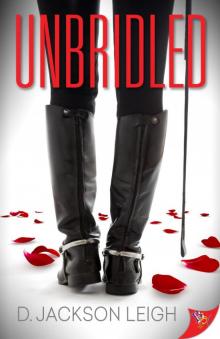 Unbridled
Unbridled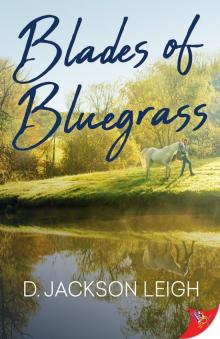 Blades of Bluegrass
Blades of Bluegrass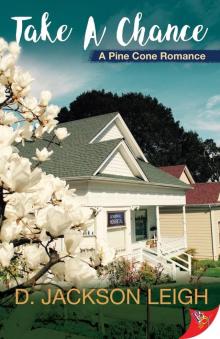 Take a Chance
Take a Chance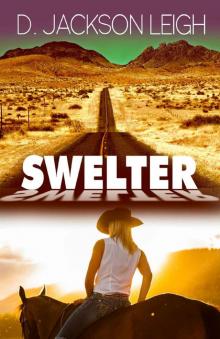 Swelter
Swelter Call Me Softly
Call Me Softly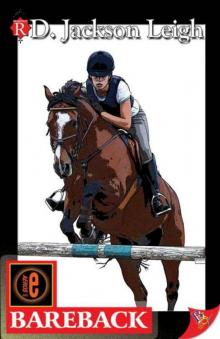 Bareback
Bareback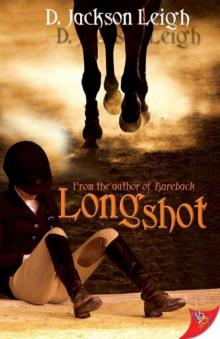 Long Shot
Long Shot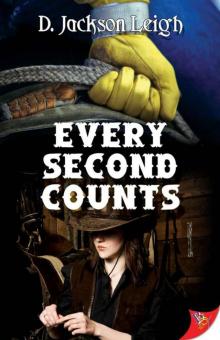 Every Second Counts
Every Second Counts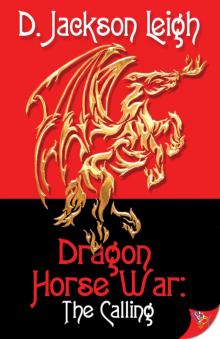 Dragon Horse War
Dragon Horse War